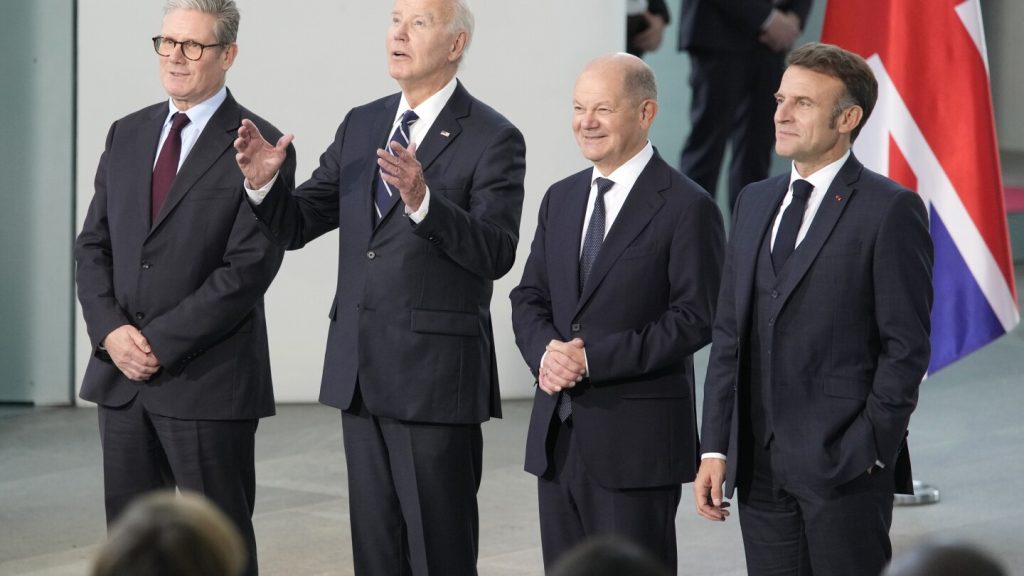U.S. President Joe Biden emphasized the importance of sustaining support for Ukraine during his meeting with European partners in Germany. With the upcoming U.S. presidential election looming, there are concerns that Donald Trump, if re-elected, could potentially disrupt the relationships that Biden is working to strengthen. Trump has shown indifference towards Ukraine’s security and skepticism towards global alliances like NATO. The European leaders did not mention Trump by name but alluded to the possibility of him withdrawing support from Ukraine and disregarding international alliances, which are viewed as crucial by Biden and his counterparts.
During the meeting, Biden highlighted the need to continue supporting Ukraine, especially as it faces challenges in the coming winter. Chancellor Scholz of Germany reiterated their commitment to stand by Ukraine as long as necessary and mentioned a planned $50 billion international loan package funded by interest on profits from frozen Russian assets. While Scholz expressed support for Ukraine, he also indicated skepticism about certain aspects of Ukrainian President Zelenskyy’s “victory plan” and has refused to supply Taurus long-range cruise missiles to Kyiv. Biden also mentioned maintaining restrictions on permitting Ukraine to use western weapons to target Russia, but did not rule out possible changes in the future.
Biden’s visit to Berlin was brief but symbolically important, as he wanted to show support for the trans-Atlantic alliance. German President Steinmeier emphasized the existential importance of the friendship between the U.S. and Germany, especially in light of recent tensions experienced during Trump’s presidency. Biden was praised for restoring hope in the trans-Atlantic alliance and was awarded Germany’s highest class of the Order of Merit. He stressed the power of democracy and alliances, underscoring the need for continued cooperation in addressing global challenges.
Discussing recent developments in the Middle East, Biden called for Israel to pursue peace following the killing of Hamas leader Yahya Sinwar. He expressed hope for a ceasefire deal between Israel and Hezbollah and acknowledged the challenges in reaching a similar agreement with Hamas. Biden also referenced the need to relieve the suffering of Palestinian civilians affected by the conflict. The U.S. and European leaders discussed the implications of Sinwar’s death and potential paths forward in the region, including negotiations on stalled ceasefire deals. Biden did not reveal details of his discussions with Israeli Prime Minister Netanyahu but highlighted the importance of finding a peaceful resolution.
The contrasting approaches of Trump and Vice President Kamala Harris towards foreign policy were evident during Biden’s visit. Trump has promised to end the conflict in Ukraine and the chaos in the Middle East, citing a tough stance on foreign relations. In contrast, Harris aligns with Biden’s support for Ukraine and Israel while emphasizing the need to alleviate the suffering of Palestinian civilians. As the U.S. presidential election approaches, the differing foreign policy positions of the candidates indicate potential shifts in U.S. engagement with global allies and security partners. Biden’s efforts to strengthen relationships with European partners signal a commitment to upholding trans-Atlantic alliances and addressing international challenges effectively.
Overall, Biden’s visit to Germany underscored the importance of sustaining support for Ukraine, promoting peace in the Middle East, and strengthening trans-Atlantic alliances. The discussions with European leaders reflected concerns about the potential impact of the upcoming U.S. presidential election on foreign policy and international relations. Biden’s emphasis on democracy, alliances, and cooperation highlighted the shared commitment of the U.S. and its allies to address global challenges together. As the election draws closer, the contrasting approaches of the candidates towards foreign policy could have far-reaching implications for U.S. engagement with key allies and security partners.


